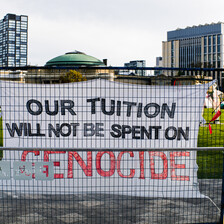The Electronic Intifada 10 May 2024

The Boston Globe refused to publish an article it had commissioned on how students are demanding justice for Palestinians.
SOPA Images/SIPA USAEditor’s note: The following article was commissioned by The Boston Globe. The newspaper refused, however, to publish it.
The Nakba is noted as the mass, violent exodus of approximately 800,000 Palestinians.
It was forced by Zionist militias between 1947 and 1949. However, Palestinians know the Nakba never ended.
This perpetuation of violence can most recently be seen through the ongoing genocide of my people in Gaza, where the US and Israel are allied in a machine of destruction and death, resulting in almost 35,000 people being massacred so far, thousands stuck under the rubble, and most of Gaza’s 2.3 million people displaced.
The experience of the Palestinian diaspora, although nothing in comparison to the active ethnic cleansing and genocide being experienced by Palestinians in Gaza, has been amplified in difficulty in the past months. College campuses, falsely paraded as the vanguard of free speech and debate in this country, have become a hotbed for repression of Palestinian activism.
In October, a peaceful sit-in for divestment from this genocide at my school, University of Massachusetts Amherst, was met with the arrests of 56 students and one staff member.
Javier Reyes, the university’s chancellor, chose to level wanton university code of conduct sanctions on these students, even though previous sit-ins were not punished with sanctions even after arrests, and even still after the criminal charges were dropped.
Arabs, Muslims and Palestinians on campus have faced unparalleled discrimination and threats to our safety since the start of the genocide. Complaints against students who had stalked me on campus, yelled racist vitriol such as “Kill all Arabs” and “Level Gaza” at me, and assaulted people at peaceful protests fell on cold, uncaring ears.
So incredible was the level of institutional failure to protect Palestinian students and repression that the US Department of Education’s Office of Civil Rights (OCR) is currently investigating UMass Amherst for anti-Palestinian racism.
The most recent example of university repression, the fascist crackdowns on “Popular Universities for Gaza” is no surprise. In April, UMass Amherst threatened arrests and academic sanctions if our encampment tents were not broken down after a day.
It is ironic, laughable even, to cite violations of land use policies on the grounds of a public university which starts every campus event stating that we are on unceded Norrwutuck and Pocomtuc land. State police in riot gear were deployed against students peacefully protesting a genocide.
Repression across America
Across the country, we are seeing unparalleled levels of state violence deployed against activists for the Palestinian cause.
We also saw other examples of institutional repression against the student intifada elsewhere in the US during April.
First, NYPD SWAT was deployed against Columbia students who had been steadfast in holding their ground through their encampment in the past weeks. NYPD brutalized hundreds of protesters, wrongfully arresting students outside and violently assaulting students, ripping off hijabs and forcing out medics and legal observers.
And second, police at the University of California, Los Angeles watched on and enabled potentially deadly assaults by Zionist militants in Los Angeles who fired live fireworks into the crowd of students and cheered for a “second Nakba.”
Certainly not a compelling example of the “freedom” the US pretends to imperially export abroad.
Western media is largely cheering on and providing cover for this genocide and the repression of student resistance in the US. While corporate news outlets focus on encampments, and the largely unsubstantiated claims of threats to Zionist students on campus, they fail to report the reason students and campuses are in revolt.
To them, the Gaza genocide is the atrocity that must not be named. Our institutions have direct ties to companies profiting from this genocide.
Discussing Zionist discomfort on elite university campuses, while watching the horrifying reality of Palestinian children being executed, buried alive and carried away in bulldozers, while mass graves are found around hospitals, is a calculated and malicious distraction diverting the national conversation away from the genocide of the Palestinian people.
We must not center ourselves. There are no more universities left in Gaza, no students left in their classrooms to feel unsafe.
Nevertheless, it is crucial to underscore that the focal point of our movement transcends individual identities, collegiate activism or the repercussions of suppression. To be sanctioned and arrested for Palestine is a badge of honor.
My enduring admiration for the resilient spirit of the people of Gaza, who persevere amidst unimaginable suffering, remains unwavering. They epitomize the essence of steadfast resistance in the face of adversity.
The liberation of Palestine is not merely a regional concern but a global imperative, necessary for the pursuit of justice and dignity for all. Let us not be swayed by trivial distractions or attempts to minimize the gravity of their plight.
Our collective solidarity with Palestinians is an affirmation of our shared humanity, a testament to our commitment to universal principles of fairness and equity. In this pursuit, their liberation becomes inexorably intertwined with our own.
Let us remain resolute in our dedication to the cause, undeterred by headlines or repressive measures aimed at silencing our voices. The Palestinian cause is just and we must materially support and protect the student activists who are answering Gaza’s call to action.
If you find yourself in opposition to our movement, I ask you this: When was the last time a student revolution was on the wrong side of history, and state repression on the right side?
Ruya Hazeyen is co-president of Students for Justice in Palestine at the University of Massachusetts Amherst.


